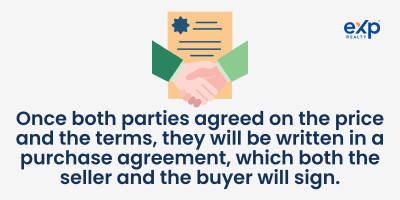Figuring out how to buy land can be a complicated process. A lot needs to happen between deciding what type of land to buy and working out financing to putting in the offer and closing the deal.
Whether you’re looking for residential land or rural lands, you can have a more successful land-buying experience when you know what to expect.
Preparing for the Purchase
The first step in purchasing land is deciding what type of property you want. This decision could depend on what you intend to use the property for.
Your plot of land may be raw land without any modifications made to it and all natural features, such as trees, hills, and water sources, still in place. This undeveloped land will also not have any utilities and may not have road access.
On the other hand, you may purchase vacant land that was once in use and may have utilities or even buildings still on it. Depending on what you intend to use the land for, having these amenities could be helpful or hinder your plans.
You should also decide how much land you want, if you have a preferred location, and whether you want mostly bare land, trees, water, or other natural features.
Financial Preparation
Preparing financially is also vital. Unless you’re buying with cash or have the option of owner financing, you will need to have both a significant down payment and excellent credit to receive a loan.
Make sure to also prepare for the additional costs of owning land, including property taxes and insurance.
Look at the land market in the area you’re interested in. Know the average prices for the type of parcel you’re looking for.
Working with a real estate agent makes the entire land purchase process easier. They can provide a list of current land for sale, give advice throughout the process, and even alert you to land deals they become aware of.
Searching for the Right Land
When targeting areas in which to search for land, consider your needs and preferences. Do you need to live in a specific area for your career or want to be close to family? Are the laws of the state or local area favorable for your purposes?
To find available properties, ask your real estate agent, or there are several virtual land sale options online, whether you are looking for agricultural land or a small rural property on which to build a house. Be willing to look at several plots of land to find the best one for you.
Make sure to consider both the attributes of the land for sale and also the properties around it. You may find an ideal piece of land, but if it is downwind from a meat packing plant or located at the end of an airport runway, for instance, it may lessen the value.
This reduced value could be a boon if you intend to live there and don’t mind the conditions, but if the land is a long-term investment, you may prefer to purchase something without these drawbacks.
It’s also worth seeing if you can look at the long-term plan for the area. Often, cities and counties will put together plans for the next 5-15 years. These documents can tell you whether your now-ideal land will be next door to a power plant or a landfill ten years down the road.
A title search should be performed by a title company to ensure there are no other owners or liens on the property. Environmental tests will determine whether the soil or water is contaminated.
Even when buying vacant land, it’s helpful if it has some basic amenities, such as road access. An established driveway connecting to a public road should give you legal access to the property, even if it crosses other properties.
If you intend to live there, look into whether basic utilities, like water, electricity, and internet access are available. If they’re not, check into what it will cost you to bring them to the property.
Zoning Rules
Zoning is another crucial item to consider. Zoning rules will determine what you are allowed to do with the land. For instance, residential homes cannot be built on commercial land, and industrial buildings cannot be built on agricultural land. The plot may look like vacant land, but it has a designated purpose.
Sometimes, zoning regulations allow you to request a change of zoning with your local government, but you shouldn’t count on this and should always check zoning maps before purchasing land.
Homeowners Associations
Homeowners associations (HOAs) often place restrictions on deeds, and real estate investors should look into this as well. These restrictions can be a pro or con, depending on your intended use of the property.
The restrictions often include details like how the property must be maintained, the type of architecture, pets, fences, vehicles, and even holiday decorations.
If you don’t want to follow the restrictions of the HOA, look for other properties. However, if you don’t find the rules unreasonable, having such regulations in place can enhance the property’s value since you know the neighbors won’t be collecting trash or junk vehicles.
All of these elements not only affect the usability of the raw land but also impact its value. Make sure you are aware of any limitations before committing to any piece of land for sale.
Making an Offer and Closing the Deal
Once you’ve found a property you would like to purchase, you will put in an offer. You may choose to offer the amount the owner asks for, or you could offer a different amount. If you feel the land is worth less than the asking price, you can put in a lower offer and hope the owner accepts. Or if you believe the land will attract a lot of offers, you can put in a higher offer in hopes that it is the best offer the owner receives.
A real estate agent will help you complete the necessary paperwork. If you are not working with an agent, it’s best to hire an attorney who specializes in real estate transactions.
You may also negotiate terms with the seller. These could include the seller cleaning up any environmental concerns before closing or taking care of maintenance issues.
Once you and the seller have agreed on the price and the terms, they will be written in a purchase agreement, which both the seller and the buyer will sign.
If there is a home already on the land, a home inspection is a wise idea. It will catch potential issues with the home that might make it a riskier investment. The inspector will check the construction and appliances and make note of problem areas the seller should be aware of. Sometimes, fixing these issues can be negotiated as a term with the seller.
Before closing, an appraisal will determine the value of the property, and if you are receiving bank or owner financing, details must be finalized so that payment can be made on closing day. Land surveys will determine the property lines of the parcel of land.
On closing day, you will pay the down payment or purchase price of the land, sign the paperwork, and prove that you have the appropriate insurance, and the land is yours.
Protecting Your Investment
New land owners need to make sure to protect their investments.
You must have homeowners insurance in place before closing on a home. If you’re buying vacant land and already own a home, you can add the land to your current homeowners’ insurance policy.
Since insurance only covers losses after the fact, it might be wise to put preventive measures in place as well, depending on the type of property you bought.
If you purchased bare land, there may be little to protect, but if you bought commercial or residential land, you could benefit from some security measures to guard against potential threats. It may be perimeter fencing, cameras, or security, depending on what is appropriate for the property.
Finally, make sure to keep on track with the plans you had for the land, whether that’s building a home or developing the property. A land planner can help ensure your plans are a safe and efficient use of your land.
Key Takeaways
The land-buying process can be complicated, and it often takes some time. A brief synopsis of the process includes the following steps:
- Deciding on the type of property
- Making financial preparations
- Work with a real estate agent or real estate attorney
- Finding land auctions or land plots for sale by owner
- Researching details of potential properties
- Make an offer and negotiate the price and terms with the seller
- Complete pre-closing appraisal, inspection, survey, etc.
- Finalize financing and close
The most vital part of the land-buying process is doing due diligence, learning as much as possible about the land, and making careful plans. Taking care of these details can save you time and money in the long run.
Now that you know more about how to buy land, begin your journey by searching for properties and contacting a real estate agent.
FAQs
Below are some of the most frequently asked questions about buying land.
What is the smartest way to buy land?
With any real estate investments, it’s wise to fully research the property and know as much about it as you can before committing to a purchase. Do a title search, know what the property taxes will be, and know its zoning and utilities.
It’s also best to make as large a down payment as you can manage.
How much money should you save before buying land?
Most land loans require a down payment of 15-20 percent. However, the larger the down payment you can make, the better your odds of getting financing and the lower your interest rate will likely be.
What to avoid when buying land?
The biggest thing to avoid when buying land is surprises. Each person may wish to avoid different things, depending on their purpose for the land, but no one wants to encounter unpleasant surprises after purchase.
Is it hard to get a loan to buy land?
Raw land loans are more difficult to get than traditional home mortgages. You may have a harder time finding a lender willing to give you a loan for undeveloped land. Furthermore, you will likely need a higher down payment and a better credit score to get approved.
What credit score do you need to buy land?
In general, you must have an excellent credit score — 720 or above — to receive financing for vacant land.
Is owning land a good investment?
Purchasing a productive piece of land is a good investment. You can use or develop land in many ways that will return your investment.
Is it smart to buy land and build later?
It can be wise to purchase land and wait to build on it if you want to build your savings back up before construction. However, you must keep in mind that you then have added expenses for taxes, insurance, and more, even while you aren’t living on it.
If you can make some sort of income from that plot of land while waiting to build, it is an excellent idea.
Is it cheaper to buy land or a house?
There is not a clear answer to this question as it depends on the size and quality of the land and the house. A large luxury home could be worth more than a small poor-quality acreage, but in general, land of any size will be more expensive than most homes.
Does land ever lose value?
Land can lose value during a recession since the value of the dollar drops. It can also lose value if something undesirable is constructed on the surrounding property.
What is the risk of owning land?
The risks of owning a piece of land mostly include potential characteristics of the land, such as it being in a flood zone or having soil that isn’t stable enough to build on.
However, these risks can largely be avoided by doing adequate research ahead of land purchases.










